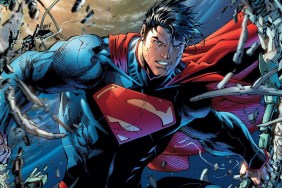
Here at Superhero Hype! in our hopes of covering every angle of the world of comic book movies, we sometimes have a chance to talk to the people who actually create the comic books, and it’s always fascinating when they’re equally involved with how their characters translate to the big screen.
That’s not what this interview is about.
Instead, it’s about the new NBC show “Heroes,” which is not based on any preexisting comic book characters, and how Tim (“Crossing Jordan”) Kring’s original idea was strong enough to bring in a few creators from the world of comic books, most notably Jeph Loeb.
If you haven’t read a comic book in the last decade or only read Archie Comics, then you might not know Loeb’s name, but as a writer, he’s been pivotal in molding Batman, Superman and the very DC Universe in the comic books. His work there led to a full-time job as writer and supervising producer on The WB show “Smallville” and then as supervising producer on the hit ABC show “Lost.”
Loeb continues his run as the busiest man working in comics and television by joining the launch of “Heroes” as writer and co-executive producer, helping Kring to tell his story of a group of regular humans who discover they have powers, but then have to figure out whether and how they want to use them.
Loeb graciously put aside some time from his busy schedule to talk with Superhero Hype! about the origins of the show and the intricate way that each episode is assembled with Tim Kring’s crack team of writers. If you’ve read any of Loeb’s comic work, you can imagine what a sharp mind is behind his writing, but this interview makes it clear that he’s as knowledgeable about writing for television as he is about comics.
SHH!: Presuming that you knew Tim Kring from your days writing “Teen Wolf Too,” how did you end up being brought onto his new show “Heroes”?
Loeb: I was on “Lost” and Damon Lindelof, who created “Lost,” had worked for Tim on “Crossing Jordan”; he’s also a comic guy. Tim had this idea for a show called “Heroes” and in doing his homework, wanted to speak to Damon and me. [Tim and I] have stayed in touch, and we were still friends, but he knew that if he was going to enter the world of people that had extraordinary abilities that he wanted someone to at least bounce his ideas off of. We had several phone conversations, which led to what I refer to as the “Powers of Walk” (as opposed to a power walk) where Tim came over to my writing office in Sherman Oaks, and we literally walked into the next town. We started at about 3:00 in the afternoon and we did not get back until about 8 or 8:30. It really was Tim playing out the entire script. He hadn’t written a word, but he knew exactly what was going to happen in every scene. What was revealed to me was that Tim had absolutely no knowledge of comic books. My favorite moment was when he talked about how one of the characters would have the powers of a magnet and could lift up a car with a wave of his hand and throw it. I said, “That’s Magneto,” and Tim’s reaction was that he didn’t know whether “Magneto” was a person or a power. What that told me in that conversation was that Tim had discovered on his own, without being a comic book guy, that it’s not about the powers, it’s about the character, which is something that those of us that have written comics have always known. Spider-Man is interesting, but infinitely more interesting because Peter Parker is interesting, that Bruce Wayne’s private life is what makes Batman interesting. Unless you work on the person underneath the powers, you don’t have anything, and Tim had it all, and that was really the most extraordinary thing about it.

SHH!: Are you involved more on the development side of this than you were with “Lost” or “Smallville”?
Loeb: No, it really was these series of conversations where if anything, it was Tim confirming what he already had. In hindsight, it made him all that more determined not to do any more research by reading comics or graphic novels or seeing comic book movies. He didn’t want to be influenced by anything. He just wanted to tell the story he wanted to tell, and then someone later on can come back and say, “Well, that’s the Invisible Woman.” It was better for him to be able to get out the story that he had locked up inside of him then to have somebody preempt that by saying that it’s just like this or just like that.
SHH!: After having those early conversations, how did you end up getting involved on the show as a writer and producer?
Loeb: After Tim finished the pilot and the show was picked up by the network for the fall season, Tim called and asked me to come over. He showed me the pilot and I was completely blown away. First, by the fact that he’d been so faithful to this story that he had told me, some of which I knew because I read the script before he started shooting it, but that it translated into moving images in such a powerful way. I finished watching it and walked into his office–I was on “Lost” at the time–and he asked what I thought, and I said, “I start Monday morning.” He laughed and we sat for hours talking about what the show could be, and he very generously said, “We’ll see you Monday.” I’m a co-executive producer, there’s a bunch of us, and one of the writers on what I think is the best writing staff working in one-hour drama television.
SHH!: Did you try to steer Tim away from using the same powers as existing comic book characters?
Loeb: As it turned out, the characters were so unique that their voices were very different than anyone who preexisted them. Are there preexisting comic characters who can fly? Yes. Dozens! But none of them are like the character in this story. It’s really that gift that Tim has to be able to get them to speak in their own voice and not have to worry whether or not he’s crossing over into a land that’s already been mined.
SHH!: You must have had some part in having your long-time collaborator, artist Tim Sale come on board. Can you talk about his involvement with the show?
Loeb: Interestingly enough, when Tim Kring started production, he called me and said that there was a character on the show, played by Santiago, who is an artist and when he paints, he can paint the future. He also is a comic book artist, which you discover in the first episode, and Tim wanted someone who could do both things. That sort of narrowed it down to a very few people. I gave Tim Kring a few names. Tim met with Tim Sale, liked him a lot and brought him on board. During the actual production of the pilot, Tim Sale actually knew more about what was going on than I did, but he’d continually tell me about things, which kept my interest very peaked about what it was that Tim Kring was creating. The wonderful part is that now that I’m on the show, I have an opportunity to work with my partner Tim Sale in a brand new medium. It’s his first stuff in that world, and he’s doing a wonderful job.
SHH!: Is it safe to assume that you already know where the story is going to go for the entire first season?
Loeb: We know what’s going to happen in the first three seasons, but as it is with any of these things, what you have is an understanding from the show’s creator where he wants to be at the beginning and the middle and the end. It’s very much like driving from New York to Los Angeles. You have the route. It just depends on how many towns you stop off in, and those towns—if we’re going to beat this metaphor to death—are the episodes that we have along the way. The question is whether or not you take 30 towns to get to Philadelphia or you take 30 towns to get to Dallas. It’s how far you down the road you really want to move this story.

SHH!: Although Tim had a lot of stuff already worked out, do you find the show more freeing than something like “Smallville” where you had a lot of stuff in place before you came on board?
Loeb: This was the first show I worked on in the first year that I hadn’t created. In the case of “Smallville” and “Lost,” those were shows that the cast was fully formed, the characters were exactly who they were going to be. What I do on anything in which I’m creatively involved is that I tell stories. In this case, all of us on the writing staff with Tim, mapped out where we thought the first season should go and what will happen to these characters, and it’s very exciting.
SHH!: Is there any room down the road to introduce a new story or idea that might not have been there when you first started the season?
Loeb: Absolutely, but everyone on the show has that opportunity. These things tend to take on a life of their own. You see a dynamic between two actors that you couldn’t know until you started making the show, and you suddenly start thinking, “Well that’s interesting. How do we put those people together more?” Or you find from watching the performance that a particular actor’s strength is really shining in one area, so you tend to bend the character towards that. Very often, casting will determine more about the character than what you had in mind. It’s better to cast a good actor than it is to find a person who you think might be right for the role.
SHH!: Is writing an episodic television show at all like writing a monthly comic or are you just focusing on one or two episodes of the series at a time?
Loeb: What’s wonderful about the show is that the writing staff is completely committed to one another, unlike anything I’ve ever seen before. One of the challenges and one of the exciting parts about writing the show is that each character has his or her own storyline, and it’s the interweaving of all that which makes it interesting. What it enables us to do is to be able to tell one character’s story over two or three episodes and be able to follow that in a way that’s very different from a show like “Smallville” where it all gets tied up at the end of the episode. When you’re playing with different chess pieces on a board, you have a wonderful opportunity to have different writers work with different voices. The way our show works—and it works really well—is that we collectively write a draft. Different scenes are handed out to different writers. Usually, you don’t do that in episodic television unless you’re way behind, affectionately known as “gang-banging.” We found that it actually gave everybody a stake in the show, so you never had a situation where any of the writers were unaware of what was going on, because every single writer is involved in the scripts. Having said that, there is a writer of record, and once all of the scenes are put together and they’re lined up by the person whose name is on the script, it’s that person’s responsibility to then go through and make the scenes work with each other. As you can imagine, if I’m writing a scene in a certain way then that’s going to help define and delineate the scene that’s coming after that. You need someone who is taking a single brush and going through the entire script. Often times, that means rewriting an entire plot or character line simply because you didn’t know whether or not it was going to work until you lined it all up. Eventually, the script becomes very much the writer whose name is on it. That’s part of the ongoing process of it and it enables the writer to be involved at every step of the way, and in particular, once the studio and network gets involved. Tim obviously runs through the script to put a fine point on the characters. When you’re this early on in a show, you absolutely want the creator of the show to make sure that his signature is there, and when you have a writer as talented as Tim, you welcome it, because it’ll certainly save you an awful lot of time and anxiety.
The things that I really missed when I was on “Smallville” and “Lost” is that I really like the producing end of the job, which is being on set and dealing with production and actors and the director and having a much more intimate relationship with how the show turns the written word into images. That’s become one of the benefits of working on this show; it’s enabled me to go and spend more time on the set, which wasn’t afforded to me at all on either of those other shows, because “Smallville” is shot in Vancouver and “Lost” is shot in Hawaii, and the writers’ rooms were in Los Angeles.

SHH!: Is the process you described very different from how it’s usually done on hour-long drama shows these days?
Loeb: Generally what happens—and every show is different—but on most shows, there’s a writers’ room. Everyone together breaks the story, which is sort of the opposite of what you’re actually doing, because you’re building the story, but breaking it down to its elements, down to a group of scenes. You talk about every single moment. Depending on how the show is run, there’s a rather detailed outline, which is written by the writer who is going to do that episode. Sometimes that person is someone on a staff who does that, collecting all the information of everyone’s thoughts, and that writer then takes that outline and goes home and writes the entire first draft. The question just becomes does that writer stay all the way through production? Does he have somebody do the production rewrites? For my experience, it actually sort of works towards the opposite, because the writer has complete control at the beginning of the process, but as they go along, but often times, it gets handed off and handed off until it’s no longer what you intended in the first place. Whereas this process that Tim Kring has created, actually starts as a group and moves towards the individual.
SHH!: Are there any characters on the show that you like in particular or that you try to write when the episodes are first broken down?
Loeb: Anybody can tackle any character they want, and what’s great about this group of writers is that they all can handle everything. We’re at Episode 8 at the moment, so we’re slowly drawn towards different characters, and at the moment, I have an enormous fondness for Niki and Micah, because of their relationship. The parenting of a 10-year-old boy is actually something I’m familiar with and the struggles of a single parent, and Ali Larter’s acting is so extraordinary that it’s a pleasure to challenge her with what’s going to happen in the script. That just so happens with what’s currently going on. I also happen to really like Suresh, the Indian professor, as well. But really, they’re all fascinating in their own way, and we’re really lucky to have a cast who, so far, has hit every scene out of the ballpark. It’s such a great surprise when the words and the actors mesh, truly wonderful.
SHH!: How have you been balancing your new production duties with your comic writing now that you’re returning to Marvel with a couple big upcoming projects?
Loeb: Badly. (laughs) The challenge is time again. I tend to write at night or I get up early, sometimes at 4:00 in the morning, and then write until I have to be on set or at the production. But this isn’t anything really new. Regardless of whether or not I needed to be on set or in the writers’ room, as someone that was working on a television series full-time, I have to be able to balance time between being a comic book writer, working on a television series, a television writer, and also having a life and being a dad.
SHH!: Considering that you have so much of this story planned ahead, what happens if the show isn’t picked up for a second season?
Loeb: You can’t go into any project believing in failure, any moreso than you can build a house and ask, “What are you going to do when the house catches on fire?” You go in and are committed to five years. We have five years worth of stories and we’re going to tell them. There’s no such thing as a sure thing and people will come to the show as they come to the show, but it’s pretty exciting when you come down to the set and the actors, the crew and the directors all want to know when the next script is coming. That’s very unique. You’re talking about a situation where people who have so many things going on and so many responsibilities, to actually get caught up in the material, in addition to their role in the material, is an extraordinary feat. It speaks volumes about the quality of the writing and the cleverness of the show that Tim created. They have no idea where it’s going. All of the actors at one time or another have come to us and said, “Can you tell us where we’re going?” Tim Kring made a choice, which was to say to them, “Actually, it’s probably better that you don’t know and that you face the challenge at each script, because it will make your performance more real.” In the same kind of way that while we may have a plan for what’s going to happen to us tomorrow or for next week, we don’t really know what’s going to happen and we play it out as it comes. We’re letting the actors have that opportunity as they respond to the material. It’s kind of heroic, in its own way!
“Heroes” debuts on NBC on September 25 with the pilot being available for download on iTunes on September 1. Stay tuned right here on Superhero Hype! for more interviews with the creators and cast.
Source: Edward Douglas





